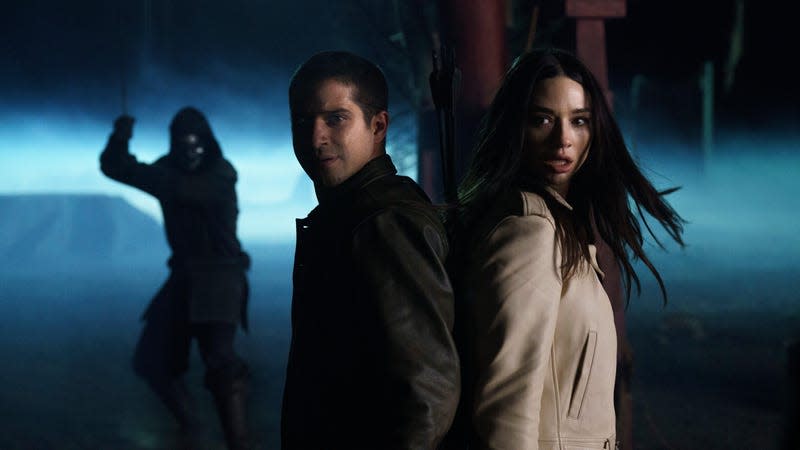Teen Wolf: The Movie review: Convoluted reboot lacks bite

- Oops!Something went wrong.Please try again later.
- Oops!Something went wrong.Please try again later.
Teen Wolf: The Movie is many things, but despite veteran director Russell Mulcahy’s brisk professionalism, a movie is not one of them. Like the series it’s based on, this fantasy project about werewolves and demons and reawakened intellectual property has the rhythm of an old-school TV soap, with most scenes ending on a note of irresolution or incompletion. It’s shot like TV, too, in basic master scene coverage that’s occasionally punctuated by a jump scare or a fight.
But Teen Wolf: The Movie has lots of virtues, at least if you’re Paramount+ and maybe a little desperate for streaming product. It’s a back-door pilot and a soft reboot, as well as a sequel. To Teen Wolf season 3, to be precise.
Read more
You remember Teen Wolf (or maybe you don’t). An MTV original series from the mid-’00s set in a supernatural universe of teenage angst, it was only pulling in around half a million viewers a week when it left the air six years ago—or roughly the same audience as the CW’s improv comedy show Whose Line is It Anyway? Like virtually everything ever made at this point, Teen Wolf has its diehard fans. But it’s hardly a universally loved cultural milestone, which isn’t stopping Paramount+ from doubling down on Teen Wolf content. Paramount+ subscribers have not one but two new werewolf projects to ponder: Teen Wolf: The Movie, plus Teen Wolf series creator Jeff Davis’ new werewolf show Wolf Pack, which he swears is its very own thing.
Teen Wolf: The Movie concerns the further misadventures of nerd-turned-werewolf Scott McCall (Tyler Posey, who looks mostly unchanged) and his misfit pals in Beacon Hills, a small town beset by supernatural occurrences in the same way Moby Dick was beset by harpoons. This resurrected series is a revival about revival: Scott, his Banshee friend Lydia (Holland Roden), and his former girlfriend Malia (Shelley Hennig) get tricked into bringing Scott’s werewolf hunter ex Allison (Crystal Reed) back from the dead as part of a larger plot to revive the Nogitsune—the Big Bad from Teen Wolf Season 3. The Nogitsune wants to revive the Oni—ghost ninjas drawn to the same demonic nine-tailed fox that manga/anime superstar Naruto used to get so worked up about on his TV shows.
Add in about a dozen major characters with intense backstories the movie doesn’t even try to explain and you have a recipe for something other than clarity; to call Teen Wolf: The Movie’s storyline tangled is to insult knotted hair. After six seasons of borrowed elements from Norse, British, Irish, Japanese, Native American, and Eastern European folklore, Teen Wolf has become a premise not just clogged by surplus mythos but constipated with it. If the Druid cultists won’t get you, the ghostly ninja fighters will.
Still, and at the risk of hyper-alliteration: Please pause to pity poor Paramount+. In a superhero-crazed era, they’re streaming’s poor relations. So when they decided to get in the game by launching a superhero project, what did the streaming service find in its corporate cupboard to reinvigorate and retcon?
Teen Wolf, so it seems.
Teen Wolf: The Movie | Official Trailer | Paramount+
You’re probably thinking: “He called Teen Wolf a superhero show. It’s a gothic horror series. Werewolves. Banshees. Hellhounds. Monster stuff.”
Kinda sorta in a sense. But Teen Wolf rigorously follows the well-worn Buffy The Vampire Slayer template (fun fact: Sarah Michelle Gellar is the marquee star of Davis’ Wolf Pack). Both Buffy and Teen Wolf use horror conceits to fuel a superpowered teen action series. Each show places a squad of misfit teens in a world of supernatural threats where everyone uncovers their inner superbeing, then they take on similarly superpowered villains.
It’s superhero stuff, in everything but name. That’s why post-Buffy show creator Joss Whedon got to create Marvel’s Avengers series and vaporize the DC Snyderverse before, of course, public opinion vaporized Whedon.
What’s perversely admirable about Teen Wolf: The Movie is that it really doesn’t give a howl in the moonlight about whether the uninitiated viewer can even understand the density of the character relationships that built up like plaque on Scott McCall’s fangs during the show’s original run. When we last saw True Alpha Werewolf Scott McCall, he’d gotten over the death of Werewolf Hunter Allison Argent by finding true love with Evolved Beta Werecoyote (that isn’t a typo) Malia Tate. That Happily Ever After moment apparently dissolved sometime in the last six years; it’s brushed aside here with an abrupt and unexplored “Well this is awkward” when Scott and Malia re-meet, and nothing more.
Jeff Davis’ Teen Wolf: The Movie screenplay proves he knows his characters well enough to sketch them in his sleep, and director Russell Mulcahy started the whole fake mythos thing with his breakthrough movie Highlander all the way back in 1986. Such veterans persist in show business because they’re reliable, not because they’re inspired. So Teen Wolf: The Movie does what it sets out to do, and that is to finally create the work of pure and unadulterated fan service the whole industry has been struggling toward for about 10 years. In such an atmosphere of arid professionalism, the fundamental question becomes whether this was a goal worth achieving. The answer will vary from viewer to viewer, probably based on their tolerance for convoluted lore. So decide for yourself, though you’ll probably need access to the Teen Wolf Wiki when you do.
(Teen Wolf: The Movie premieres on Paramount+ on January 26.)
More from The A.V. Club
Sign up for The A.V. Club's Newsletter. For the latest news, Facebook, Twitter and Instagram.

